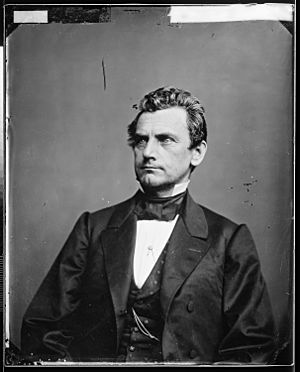George P. Fisher facts for kids
Quick facts for kids
George P. Fisher
|
|
|---|---|
 |
|
| Associate Justice of the Supreme Court of the District of Columbia | |
| In office March 11, 1863 – May 1, 1870 |
|
| Appointed by | Abraham Lincoln |
| Preceded by | Seat established by 12 Stat. 762 |
| Succeeded by | David Campbell Humphreys |
| Member of the U.S. House of Representatives from Delaware's at-large district |
|
| In office March 4, 1861 – March 3, 1863 |
|
| Preceded by | William G. Whiteley |
| Succeeded by | William Temple |
| Attorney General of Delaware | |
| In office 1855–1860 |
|
| Governor | Peter F. Causey William Burton |
| Preceded by | Willard Saulsbury Sr. |
| Succeeded by | Alfred Wooten |
| Personal details | |
| Born |
George Purnell Fisher
October 13, 1817 Milford, Delaware |
| Died | February 10, 1899 (aged 81) Washington, D.C. |
| Resting place | Methodist Cemetery Dover, Delaware |
| Political party | Unionist |
| Education | Dickinson College read law |
George Purnell Fisher (born October 13, 1817 – died February 10, 1899) was an important figure in Delaware and Washington, D.C. He held many public roles during his life. He was a lawyer, a state official, a member of the U.S. Congress, and a federal judge.
Contents
Early Life and Education
George P. Fisher was born on October 13, 1817, in Milford, Delaware. He went to public schools in Kent County, Delaware. He also studied at Mount St. Mary's College in Maryland. In 1838, he graduated from Dickinson College in Pennsylvania.
After college, Fisher studied law with John M. Clayton. Clayton was the Chief Justice of the Delaware Supreme Court. George Fisher became a lawyer in 1841 and started his own practice in Dover.
Public Service in Delaware
George Fisher held several important jobs in Delaware. In 1843, he worked as a clerk for the Delaware Senate. The next year, he was a member of the Delaware House of Representatives.
From 1846 to 1847, he served as the Secretary of State of Delaware. He was appointed by Governor Joseph Maull. He also worked as an aide to Major General Nathaniel Young. From 1855 to 1860, Fisher was the Attorney General of Delaware.
Working with U.S. Leaders
George Fisher also worked with national leaders. From 1849 to 1850, he was a private clerk for U.S. Secretary of State John M. Clayton. He helped with a treaty called the Clayton–Bulwer Treaty with Great Britain. This treaty was about building a canal across Central America.
From 1850 to 1852, he helped settle claims from U.S. citizens against Brazil. In 1852, he became the private secretary for President Millard Fillmore.
Serving in Congress
In 1860, George Fisher was elected to the United States House of Representatives. He represented Delaware as a member of the Unionist Party. He served in Congress from March 1861 to March 1863.
Supporting Lincoln's Ideas
While in Congress, Fisher supported President Abraham Lincoln's idea of "compensated emancipation." This plan would have paid slave owners to free their enslaved people. Fisher tried to get this idea introduced in Delaware, but he was not successful.
After his time in Congress, in 1863, Fisher became a Colonel in the First Delaware Cavalry.
Becoming a Federal Judge
On March 10, 1863, President Abraham Lincoln chose George Fisher to be a federal judge. He was nominated to the Supreme Court of the District of Columbia. This court is now known as the United States District Court for the District of Columbia.
The United States Senate approved his nomination the next day. He officially became a judge on March 11, 1863. He served as a judge until May 1, 1870, when he resigned.
A Famous Trial
In 1867, Judge Fisher oversaw an important trial. He presided over the trial of John Surratt. Surratt was one of the people involved in the plot to assassinate President Abraham Lincoln.
Later Public Roles
After leaving his judge position, Fisher continued to serve the public. From 1870 to 1875, he was the United States Attorney for the District of Columbia. This job involves representing the U.S. government in legal cases.
Later, in 1889, President Benjamin Harrison appointed him again. Fisher became the first auditor for the United States Department of the Treasury. He held this role until 1893.
Final Years and Legacy
After his last public job, George Fisher returned to his childhood home. He spent his final years reading and enjoying his large library. He passed away after a short illness on February 10, 1899, in Washington, D.C..
He was first buried in Oak Hill Cemetery in Washington, D.C. Later, he was re-interred in the Methodist Cemetery in Dover, Delaware.

